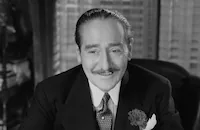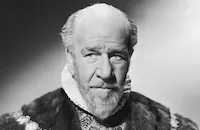Heartbeat
Brief Synopsis
Cast & Crew
Sam Wood
Ginger Rogers
Jean Pierre Aumont
Adolphe Menjou
Melville Cooper
Mikhail Rasumny
Film Details
Technical Specs

Synopsis
When pretty, hungry Parisian Arlette Lefon inquires about work at Professor Aristide's "professional school," she is unaware that it only provides training for pickpockets. Although Aristide at first rejects Arlette for being too honest, he changes his mind when he finds out that she is a reform school runaway. Under Aristide's exacting tutelage, Arlette quickly learns the various skills necessary to be an effective pickpocket. Despite her educational successes, however, Arlette confides to fellow pupil Yves Cadubert that she intensely dislikes the idea of stealing. The sympathetic Yves tells Arlette that marriage is the only honest way to avoid reform school and offers to connect her with a friend who arranges marriages for a 3,000 franc fee. Struck by Yves suggestion, Arlette declares that she will steal the 3,000 francs to stay "honest" and pickpockets a pearl tie pin from a distinguished man on the street. The man, however, is aware of the theft and corners Arlette in a movie theater. Instead of reporting her to the police, the man, an ambassador, takes her to his lavish home and forces her to dress in a ball gown. The ambassador then blackmails his adulterous colleague, Baron Dvorak, to pose as Arlette's uncle and escort her to a diplomatic ball. There the ambassador orders Arlette to dance with handsome junior diplomat Pierre and steal his pocket watch. Before she gives the stolen watch to the ambassador, Arlette notices it contains a photograph of the ambassador's wife. When the jealous ambassador inspects the watch, however, he is relieved to find it empty and tells Arlette to return it to Pierre. Impressed by Arlette's youth and beauty, the unsuspecting Pierre insists on driving her to her "uncle's" home and kisses her on the moonlit street. Although intoxicated by Pierre's charms, Arlette tells him that she is leaving for Geneva the next day and is stunned when he gleefully announces that he is going there on the same train. Back at the professor's, Arlette lies about her activities and is accused of a double-cross. After Aristide throws her out, Arlette rushes to the train station and tells Pierre the truth about herself. Unaware that Arlette removed the photograph, Pierre runs to telephone the ambassador's wife. While he is talking, he misses his train, but the lovestruck Arlette recovers his dog and his baggage and returns them to his house. Feeling sorry for the runaway, Pierre invites her to stay with him and then gets the idea to pay his perpetually broke friend, Roland Medeville, 10,000 francs to marry her "in name only." Although Pierre arranges for the phony marriage to take place while he is in Geneva, he later regrets his actions and returns prematurely to Paris. To his astonishment, he discovers that Arlette has been transformed by Roland into a sophisticated woman. When a gushing Roland tells Pierre that he now wants more than a marriage in name only, Pierre confesses that he loves Arlette. Roland convinces him to drop the romance, however, by reminding him that it would ruin his diplomatic career. Once at the altar, however, Arlette says no to Roland and prepares to return to the street. Yves, who has been working as Pierre's butler, assures Arlette that Pierre loves her, and she determines to prove herself worthy of his station. Dressed in the gown that the ambassador gave her, Arlette resumes her impersonation of the baron's niece at another diplomatic ball. There Pierre is further impressed by Arlette's transformation, and while the chagrined ambassador forces the baron to agree to adopt Arlette, Pierre proposes. Their respective dilemmas thus resolved, Arlette and Pierre marry.

Director

Sam Wood
Cast

Ginger Rogers

Jean Pierre Aumont

Adolphe Menjou

Melville Cooper
Mikhail Rasumny

Eduardo Ciannelli

Mona Maris

Henry Stephenson

Basil Rathbone
Torben Meyer
Ivan Lebedeff
Louis Mercier
Rommie
Crew
C. Bakaleinikoff
Lionel Banks
Wilbur Bradley
Carl F. Cook
Russell A. Cully
Lonnie D'orsa
Ralph Dawson
Ervin Drake
Lynn Dunn
Joe C. Gilpin
Howard Greer
Roland Gross
Raymond Hakim
Raymond Hakim
Robert Hakim
Robert Hakim
Milton Howe
Terry Kellum
Rowland Leigh
Paul Misraki
Paul Misraki
Earl B. Mounce
Jack Murton
Morrie Ryskind
George Sawley
H. De Schulthess
John Sherwood
Al Simpson
John Tribby
Joseph Valentine
Vernon L. Walker
J. R. Whittredge

Film Details
Technical Specs

Quotes
Trivia
Notes
Although not mentioned in reviews or news items, the "original screenplay" on which this picture was based and credited onscreen was first filmed in Italy, as Batticuore. Mario Camerini directed and John Lodge and Assia Noris starred in 1938 in the Italian film. In 1939, Henri Decoin directed Danielle Darrieux in Battement de coeur, a French version of the same script. Reviews and news item generally refer to the French picture as the source of the American film. As early as May 1942, Hollywood Reporter announced that producer Gregor Rabinovitch was planning to remake "his French production Heartbeat," which was to be released by United Artists. By April 1945, however, Hollywood Reporter reported that Robert and Raymond Hakim and Ginger Rogers were joining forces to remake Battement de coeur on a one million dollar budget. Heartbeat was the first collaboration of Rogers and director Sam Wood since RKO's 1940 film Kitty Foyle.
A July 1951 Hollywood Reporter article gives the following information about the film's unusual financing: As part of their distribution deal, RKO agreed to defer all studio space costs and other charges over $185,000, while Security-First National Bank agreed to finance seventy-two percent of production cost up to $875,000. Wood deferred his $75,000 directorial fee, while Consolidated Film Industries consented to lend the production $75,000. New World Productions had to procure only $100,000 in "loans and otherwise" in order to start filming. In 1951, David L. Loew sued New World because $200,000 in a "second money loan" he had given to the film had not been repaid. The final disposition of that suit has not been discovered.
Hollywood Reporter news items add the following information about the production: Director Wood and executive assistant Lonnie D'Orsa canvassed the Russian section of Los Angeles' Boyle Heights district for "types" to cast in the production. Wood devised a new system of casting for the picture by "mass testing" all of the roles requiring tryouts in a single session. New World Productions borrowed casting director Jack Murton from International Pictures for the film, and RKO borrowed actor Mikhail Rasumny from Paramount. Fortunio Bonanova was cast in the production, but his appearance in the final film has not been confirmed. Mildred Thorpe, a seventeen-year-old USC student, was signed by Sam Wood for a role, but her appearance in the final film has not been confirmed. Some scenes were shot at California Studios, and others were filmed at M-G-M. Ralph Dawson is listed in Hollywood Reporter production charts as editor, although Roland Gross and J. R. Whittredge are listed onscreen. Modern sources credit Eddie Hayden as "the fat thief." Modern sources also credit Mel Berns as makeup artist and John Miehle as still photographer.












